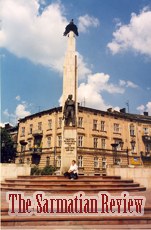| This Issue | Back Issues | Editorial Board | Contact Information |

In Praise of the Unfinished
James E. Reid
Selected Poems
By Julia Hartwig. Translated by John and Bogdana Carpenter. New York: Knopf., 2008 160 pages. ISBN 978-0307267207. Hardcover.$25.00.
Ryszard Kapuściński and Julia Hartwig both share the capacity to regard what is terrible, and what redeems us, with a clear eye. There is a chilling moment in Kapuściński’s recollection (Paris Review, Spring 2007) of a day when he was caught in the open in one of the world’s forgotten and continuing genocides, in the Congo. Armed to the teeth, two men approached him. He describes them as “dehumanized creatures” who could kill him without another thought. In French, one of the men asks Kapuściński for a cigarette. In a small human gesture, he gives the men his pack of cigarettes-and lives to write another day.
I Wrote Stone is the first collection of Kapuściński’s poetry to appear in English. It exhibits his need to bear witness. The book draws from two books of his poetry and some of his later poems, written over the course of 60 years. His commitment to look at the world and not look away is clear in these poems. An early poem from Notebook echoes the incident in the Congo. In “Nights in Africa,” set in the neighboring Central African Republic, a pair of eyes approach in the darkness. Kapuściński wonders whose eyes they are, “God forbid-an assassin from Bokassa’s guard,” before seeing a young girl appear, to his great relief.
In “Language,” the poet is invited by a high-ranking Polish official to become part of the endemic betrayals under the Soviet occupation. The betrayals are disguised in language that describes a form of wrestling. With excessive bonhomie, the official jokes about his own decision to take up wrestling himself, along with other “decent guys who deserve a life.”Kapuściński’s risky refusal to reply indicates his refusal to comply.
The poems in I Wrote Stone strengthen as the book proceeds. There is great tenderness in “Dispatch from the Other World,” when the poet discovers he is reading a notice about the unexpected death of a friend he still assumes is alive, and recalls their recent agreement to meet, “How happy I am, she’d said.” Kapuściński’s “Biblical Parable” about our everyday experience manages to breathe powerful new meaning into the hoary old question about “a mote/in your brother’s eye,” and rejuvenates its wisdom about forgiveness, self awareness, and judging others. The second to last poem in the book, “You’ll never make up,” is a small jewel of equanimity and acceptance. If only there was more of Kapuściński’s poetry.
A small cavil about one poem in each of these fine collections. Lists are a challenge in poetry. When they work they can shift the reader to sudden and unexpected places. When a list doesn’t work, the poem falters. Kapuściński’s “How Many More Worlds” begins with God, and sweeps through Homer, Mozart, Bosch and Chagall, among others. Short on specifics and long on famous names, the central idea in the poem fades instead of resolving. The same problem arises in Hartwig’s “Transfer of Power.” Eight artists who painted trees, from Sisley to Watteau, appear in ten lines of poetry. The roster of names overwhelms her sweet suggestions about the magic of trees. In contrast, Zbigniew Herbert’s lists are bold but effective-so inventive and tangible that the quotidian approaches the mildly vertiginous. Look at his poem “Request” from Elegy for the Departed. The dozen jumbled discoveries in a small casket are vivid.
Cavil aside, Julia Hartwig’s volume is a welcome collection. In a world of increasingly disposable books, the textured dust jacket, fine page paper, and pleasing type face are a pleasure. There are many lyric poems and elegies here that sometimes unfold in surprising ways. “Winds” dwells on the variety of winds that sweep over the earth, but concludes as a reverie about the experience of not being able to travel, or the limits imposed by aging. “There Are Poems” concludes with an unexpected homage to the Polish Romantic poet Adam Mickiewicz, now rubbing shoulders with Dante. “Meditation (on Czesław Młosz)” defends him against unnamed detractors (perhaps Herbert among them), and appreciates what is best in his work. The penultimate poem in the book recalls Joseph Brodsky’s capacity to continue to hear his muse, in spite of “the flatterers and slanderers.”
During the Soviet occupation of Poland writers faced difficult choices. One choice was to write poetry so obscure that it befuddled the censors, and went right over their heads. Political poetry suffered. Hartwig’s political themes are presented with the quiet power that is often most effective for writing that reclaims a lost history of brutal rule. “Speak To Us” responds to the horror of Katyn. It opens with a call to “respect the differences of others,” and moves on to deal with the nightmares that followed the massacre. The poem concludes with these lines, “Lord we aren’t the only nation tormented this way/don’t let us take pride in it.” Her moving “Lublin Elegy” is immediately followed by the painful experience in “Victoria.” It speaks of the wartime joy and confusion of welcoming liberators who brought four decades of oppression:
Why was I fated to be on the main street of Lublin
watching regiments with red stars enter the city
crying with joy I would no longer hear the hated Raus! and Halt!
Why? In order to praise the unfinished, and what it is to be human.
In Praise of the Unfinished is the first book of Hartwig’s poetry translated into English. The translation by John and Bogdana Carpenter is so fluid and thoughtful that you are unaware that you are reading a translation. The collection demonstrates the truth of Ryszard Kapuściński’s description of Hartwig: “She is one of the foremost Polish poets of the twentieth century.”
.Back to the January 2009 Issue
The Sarmatian Review
sarmatia@rice.edu
Last updated 2/21/09